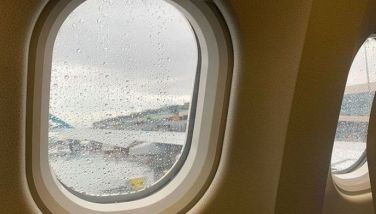DTI nixes bid of petrochem sector for tariff protection

May 26, 2001 | 12:00am
Petrochemical industry players will not get the government’s help in seeking an extension of the existing tariff wall on petrochem products unless a new Memorandum of Agreement (MOA) is reached by the major players on a proposed naphtha cracker plant.
The country’s major petrochem players such as the Philippine National Oil Co., Petrochemical Development Corp., the Bataan Polyethylene Corp., the Philippine Resins and Industries Inc., Petrocorp of Asia, and British Petroleum had signed an agreement with the Department of Trade and Industry (DTI) last year up a naphtha cracker plant in Limay, Bataan.
The naphtha cracker plant is necessary in the production of plastic. The project failed to take-off as the consortium members could not agree on several major issues.
Government now wants the project participants to sign a new MOA before the end of October before it takes an action on the petrochem industry’s desire for further tariff protection until the year 2010.
Under the now MOA that the participants will sign, government now wants a clear identification of the key players in the planned naphtha cracker plant project; off-take agreements; feasibility studies and their financial plans.
Based on their initial projections, the construction of the proposed naphtha cracker plant would cost around $600 million and would have been operational by the year 2004.
If the players are able to sign a new MOA by end-October, government would help seek an extension of the current tariff levels ranging from seven percent to 15 percent.
Under the ASEAN Free Trade Agreement (AFTA), the Philippines is supposed to bring this down to five percent by the year 2003.
Earlier, Trade and Industry Secretary Manuel Roxas II told the industry that asking for a tariff extension up to 2010 may not be possible.
He pointed out that Malaysia had only asked for an extension of up to 2005 for its tariff wall for its automotive industry. "It’s not realistic," Roxas pointed out.
The Trade and Industry Secretary said that the government would study the impact of maintaining high tariffs against the needs of the industry, other downstream manufacturers and consumers.
Roxas noted that maintaining high tariffs to protect a product over a long period of time would only result in higher prices for consumers.
Government had earlier indicated that it would be willing to negotiate for an extension of the tariff wall for the petrochem industry in an effort to help it succeed with a planned naphtha cracker plant.
The country’s major petrochem players such as the Philippine National Oil Co., Petrochemical Development Corp., the Bataan Polyethylene Corp., the Philippine Resins and Industries Inc., Petrocorp of Asia, and British Petroleum had signed an agreement with the Department of Trade and Industry (DTI) last year up a naphtha cracker plant in Limay, Bataan.
The naphtha cracker plant is necessary in the production of plastic. The project failed to take-off as the consortium members could not agree on several major issues.
Government now wants the project participants to sign a new MOA before the end of October before it takes an action on the petrochem industry’s desire for further tariff protection until the year 2010.
Under the now MOA that the participants will sign, government now wants a clear identification of the key players in the planned naphtha cracker plant project; off-take agreements; feasibility studies and their financial plans.
Based on their initial projections, the construction of the proposed naphtha cracker plant would cost around $600 million and would have been operational by the year 2004.
If the players are able to sign a new MOA by end-October, government would help seek an extension of the current tariff levels ranging from seven percent to 15 percent.
Under the ASEAN Free Trade Agreement (AFTA), the Philippines is supposed to bring this down to five percent by the year 2003.
Earlier, Trade and Industry Secretary Manuel Roxas II told the industry that asking for a tariff extension up to 2010 may not be possible.
He pointed out that Malaysia had only asked for an extension of up to 2005 for its tariff wall for its automotive industry. "It’s not realistic," Roxas pointed out.
The Trade and Industry Secretary said that the government would study the impact of maintaining high tariffs against the needs of the industry, other downstream manufacturers and consumers.
Roxas noted that maintaining high tariffs to protect a product over a long period of time would only result in higher prices for consumers.
Government had earlier indicated that it would be willing to negotiate for an extension of the tariff wall for the petrochem industry in an effort to help it succeed with a planned naphtha cracker plant.
BrandSpace Articles
<
>
- Latest
- Trending
Trending
Latest
Trending
Latest
Recommended



























